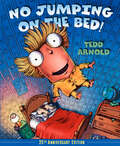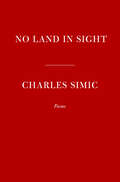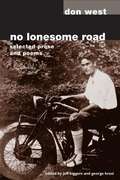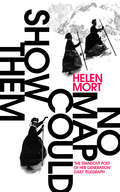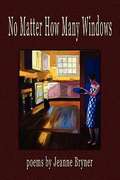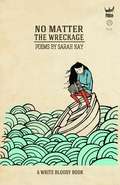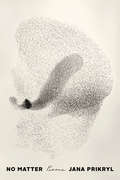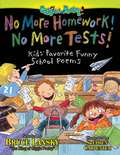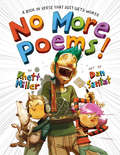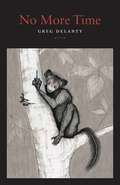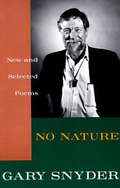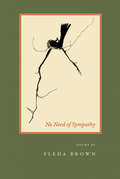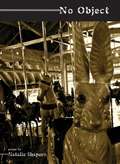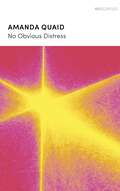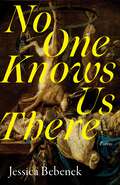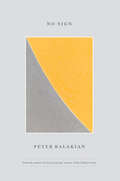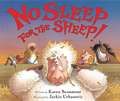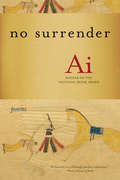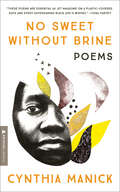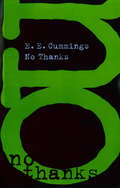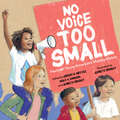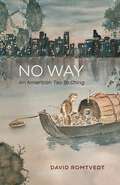- Table View
- List View
No Jumping on the Bed 25th Anniversary Edition
by Tedd ArnoldFully re-illustrated for its anniversary, this classic is funnier and more kid-appealing than ever In celebration of twenty-five gleeful years in print, Tedd Arnold has created all-new artwork in the zany style he is now known and loved for - the style of his other bestsellers Hi! Fly Guy and Parts.
No Land in Sight: Poems
by Charles SimicFrom one of America's most beloved poets, a piercing new collection reflecting on the characters and encounters that haunt us through this life and into the nextLeading us into a city stirring with gravediggers and beggars, lovers and dogs, Charles Simic returns with a brilliant collection full of his singular wit, dark humor, and tenderheartedness. In poems that are often as spare as they are monumental, he captures the fleeting moments of modern life—peering inside pawnshop windows, brushing shoulders with strangers on the street, and walking familiar cemetery rows—to uncover all the beauty and worry hiding in plain sight. As the poet reflects on a lifetime&’s worth of pleasure and loss, he recalls instances when he &“made excuses and hurried away,&” and considers the way memory always trails just behind. No Land in Sight is a testament to all we leave in our wake and, simultaneously, all we hang on to: the passing minutes, the evening&’s stillness, and the many lives we inhabit in dim thresholds and bright mornings alike.
No Lonesome Road: SELECTED PROSE AND POEMS
by Don West Jeff Biggers George BrosiThis is the first book to celebrate the life and writing of one of the most charismatic Southern leaders of the middle twentieth century, Don West (1906-1992). West was a poet, a pioneer advocate for civil rights, a preacher, a historian, a labor organizer, a folk-music revivalist, an essayist, and an organic farmer. He is perhaps best known as an educator, primarily as cofounder of the Highlander Folk School in Tennessee and founder of the Appalachian South Folklife Center in West Virginia. In his old age, West served as an elder statesman for his causes. No Lonesome Road allows Don West to speak for himself. It provides the most comprehensive collection of his poetry ever published, spanning five decades of his literary career. It also includes the first comprehensive and annotated collection of West's nonfiction essays, articles, letters, speeches, and stories, covering his role at the forefront of Southern and Appalachian history, and as a pioneer researcher and writer on the South's little-known legacy of radical activism. Drawing from both primary and secondary sources, including previously unknown documents, correspondence, interviews, FBI files, and newspaper clippings, the introduction by Jeff Biggers stands as the most thorough, insightful biographical sketch of Don West yet published in any form. The afterword by George Brosi is a stirring personal tribute to the contributions of West and also serves as a thoughtful reflection on the interactions between the radicals of the 1930s and the 1960s. The best possible introduction to his extraordinary life and work, this annotated selection of Don West's writings will be inspirational reading for anyone interested in Southern history, poetry, religion, or activism.
No Map Could Show Them
by Helen Mort* A Poetry Book Society Recommendation 2016*'When we climb aloneen cordée feminine,we are magicians of the Alps –we make the routes we followdisappear'The poems of Helen Mort's second collection offer an unforgettable perspective on the heights we scale and the distances we run, the routes we follow and the paths we make for ourselves.Here are odes to the women who dared to break new ground – from Miss Jemima Morrell, a young Victorian woman from Yorkshire who hiked the Swiss Peaks in her skirts and petticoats, to the modern British mountaineer Alison Hargreaves, who died descending from the summit of K2.Distinctive and courageous, these are poems of passion and precipices, of edges and extremes. No Map Could Show Them confirms Helen Mort’s position as one of the finest young poets at work today.
No Matter How Many Windows
by Jeanne BrynerThe stories of four generations of Women are documented in poems - both the horrors and delights of a family.
No Matter the Wreckage
by Sarah KayNo Matter the Wreckage presents readers with new and beloved poetry that showcases Kay's talent for celebrating family, love, travel, and unlikely romance between inanimate objects ("The Toothbrush to the Bicycle Tire"). Both fresh and wise, Kay's poetry allows readers to join her on the journey of discovering herself and the world around her.
No Matter: Poems
by Jana PrikrylAn urgent, visionary collection of poems from the author of The After Party “One of the most original voices of her generation.”—James Wood Jana Prikryl’s No Matter guides the reader through cities—remembered and imagined—toppling past the point of decline and fall. Conjured by voices alternately ardent, caustic, grieving, but always watchful, these soliloquies move from free verse through sonnets and invented forms, insisting that every demolition builds something new and unforeseen. In reactionary times, these poems say, we each have a responsibility to use our imagination. No Matter is an elegy for our ongoing moment, when what seemed permanent suddenly appears to be on the brink of disappearing.
No More Homework! No More Tests!: Kids' Favorite Funny School Poems (Giggle Poetry)
by Bruce Lansky Stephen CarpenterNo More Homework! No More Tests! includes the funniest poems about school ever collected in one book. <P><P> These hilarious poems were written by a number of poets, including Shel Silverstein, Jack Prelutsky, David L. Harrison, Colin McNaughton, Carol Diggory Shields, Kalli Dakos, and Bruce Lansky. Sillier than a teacher with hiccups, funnier than toilet paper stuck to the bottom of the principal's shoe, it is certain to have readers laughing by the first page. <P> This book puts the cool back in school and makes students WANT to write and read poetry. Appropriate for Grades 1-6, and Ages 5-12.
No More Poems!: A Book in Verse That Just Gets Worse
by Rhett MillerAcclaimed singer-songwriter Rhett Miller teams up with Caldecott Medalist and bestselling artist Dan Santat in a riotous collection of irreverent poems for modern families. In the tradition of Shel Silverstein, these poems bring a fresh new twist to the classic dilemmas of childhood as well as a perceptive eye to the foibles of modern family life. Full of clever wordplay and bright visual gags--and toilet humor to spare--these twenty-three rhyming poems make for an ideal read-aloud experience. Taking on the subjects of a bullying baseball coach and annoying little brothers with equally sly humor, renowned lyricist Rhett Miller's clever verses will have the whole family cackling.
No More Time
by Greg DelantyIn No More Time, Greg Delanty offers a celebration of the natural environment that also bemoans its mistreatment at the hands of humans. The collection’s long sequence, “A Field Guide to People,” is an alpha-bestiary of twenty-six sonnets, each a meditation on a species of flora or fauna that is thriving, endangered, or extinct. Evoking an earthly heaven, purgatory, and hell for plants and animals, these poems function also as love letters to the biosphere as they connect the past with the present in both form and content. In the middle of this sonnet sequence, a section labeled “Breaking News” gives voice in poetry to the political state of our planet with a balance of pathos, wit, and hope. Delanty stresses the deep underlying connections within and between the natural world and humankind, rather than the fragmented world stressed at the beginning of the twentieth century. No More Time witnesses the effects of climate change and presents a vital view of what remains at stake for engaged global citizens in the twenty-first century.
No Nature: New and Selected Poems
by Gary SnyderNo Nature marks the first collection from the whole of Snyder's work as a poet.
No Need of Sympathy
by Fleda BrownNo Need of Sympathy is an exceptionally wide-ranging poetry collection, touching on contemporary science, physics, family, politics, and the natures of poetry and reality. These poems, the eighth collection by Fleda Brown, ask huge questions; they zero in like a microscope on what's here, at hand. They are spoken with humility, great humor, curiosity, and a deep love of living.
No Need of Sympathy (American Poets Continuum)
by Fleda BrownNo Need of Sympathy is an exceptionally wide-ranging poetry collection, touching on contemporary science, physics, family, politics, and the natures of poetry and reality. These poems, the eighth collection by Fleda Brown, ask huge questions; they zero in like a microscope on what’s here, at hand. They are spoken with humility, great humor, curiosity, and a deep love of living.
No Object
by Natalie Shapero"It is unbefitting to believe in ghosts, to believe what one reads,/what one writes,"writes Natalie Shapero in her mischievous debut collection. With sharp wit and relentless questioning, Shapero crafts poems a reader can, if not believe in, then trust--to level with us, to surprise us, and to stay with us long after we put the book down. No Object is a fast ride you will not easily forget. "Shapero fastens you in a roller coaster car that creeps up a rickety hill, zooms into an abyss, then flips upside down to deliver you safely, wanting to take the ride all over again." --Denise Duhamel
No Obvious Distress: A John Murray Original
by Amanda Quaid'Striking, surprising, and technically excellent, the poems resonate way beyond their endings' Roger Robinson'Deft, daring, devastating and delightful' Pádraig Ó Tuama'Astonishing. These poems glimmer with a white-hot beauty that is hard won, and that sings' Sarah RuhlPatient is a normal appearing woman in no obvious distress.On an ordinary day, out with her three-year-old in the park, Amanda Quaid received a life-changing call - the back pain she had been living with for years was actually a rare and aggressive form of cancer. In an instant, life became a series of sterile rooms, medical charts and body-altering treatments which completely upend Amanda's marriage, work and family life as she knows it.Poetry became a lifeline for Amanda, a form to organize the chaos and pain of day-to-day life into order and beauty. In inventive and arresting poems that explore desire, marriage, motherhood and mortality, No Obvious Distress is a powerful memoir-in-verse about Amanda's unique experience. But it is also a tender, witty and universal collection that asks how we can continue to live and love in times of uncertainty.
No Obvious Distress: A John Murray Original
by Amanda Quaid'Striking, surprising, and technically excellent, the poems resonate way beyond their endings' Roger Robinson'Deft, daring, devastating and delightful' Pádraig Ó Tuama'Astonishing. These poems glimmer with a white-hot beauty that is hard won, and that sings' Sarah RuhlPatient is a normal appearing woman in no obvious distress.On an ordinary day, out with her three-year-old in the park, Amanda Quaid received a life-changing call - the back pain she had been living with for years was actually a rare and aggressive form of cancer. In an instant, life became a series of sterile rooms, medical charts and body-altering treatments which completely upend Amanda's marriage, work and family life as she knows it.Poetry became a lifeline for Amanda, a form to organize the chaos and pain of day-to-day life into order and beauty. In inventive and arresting poems that explore desire, marriage, motherhood and mortality, No Obvious Distress is a powerful memoir-in-verse about Amanda's unique experience. But it is also a tender, witty and universal collection that asks how we can continue to live and love in times of uncertainty.
No One Knows Us There
by Jessica BebenekFrom wherever I am, I willsend word like a golden thread,rolling an unravelling ball through time?towards myself.In this stunning debut collection, Bronwen Wallace Award finalist Jessica Bebenek presents two distinct and moving portraits of early womanhood. The first is that of the devoted, caregiving granddaughter navigating hospital hallways and the painful realities of palliative care. The second is that of a woman a decade older, compassionately looking back on her younger self, honouring unimaginable loss and turning it into genuine healing.All at once sensual, visceral, and dreamlike, No One Knows Us There takes us from the sterility of the hospital into the sumptuous natural world. We face horror in a manicured garden and discover beauty in the untamed woods. A theoretical mathematician leads us to an elk encounter, the crooked bodies of birds are found in the spring thaw, and we become our own pet snail in a mason jar.Ultimately, grief is radically transformed through plainspoken yet lyrical language, and this keen examination of trauma evolves into a striking celebration of the inevitability of change.
No Sign (Phoenix Poets)
by Peter BalakianNew poetry collection from Peter Balakian, author of Ozone Journal, winner of the Pulitzer Prize. In these poems, Peter Balakian wrestles with national and global cultural and political realities, including challenges for the human species amid planetary transmutation and the impact of mass violence on the self and culture. At the collection’s heart is “No Sign,” another in Balakian’s series of long-form poems, following “A-Train/Ziggurat/Elegy” and “Ozone Journal,” which appeared in his previous two collections. In this dialogical multi-sectioned poem, an estranged couple encounters each other, after years, on the cliffs of the New Jersey Palisades. The dialogue that ensues reveals the evolution of a kaleidoscopic memory spanning decades, reflecting on the geological history of Earth and the climate crisis, the film Hiroshima Mon Amour, the Vietnam War, a visionary encounter with the George Washington Bridge, and the enduring power of love.. Whether meditating on the sensuality of fruits and vegetables, the COVID-19 pandemic, the trauma and memory of the Armenian genocide, James Baldwin in France, or Arshile Gorky in New York City, Balakian’s layered, elliptical language, wired phrases, and shifting tempos engage both life’s harshness and beauty and define his inventive and distinctive style.
No Sign (Phoenix Poets)
by Peter BalakianNew poetry collection from Peter Balakian, author of Ozone Journal, winner of the Pulitzer Prize. In these poems, Peter Balakian wrestles with national and global cultural and political realities, including challenges for the human species amid planetary transmutation and the impact of mass violence on the self and culture. At the collection’s heart is “No Sign,” another in Balakian’s series of long-form poems, following “A-Train/Ziggurat/Elegy” and “Ozone Journal,” which appeared in his previous two collections. In this dialogical multi-sectioned poem, an estranged couple encounters each other, after years, on the cliffs of the New Jersey Palisades. The dialogue that ensues reveals the evolution of a kaleidoscopic memory spanning decades, reflecting on the geological history of Earth and the climate crisis, the film Hiroshima Mon Amour, the Vietnam War, a visionary encounter with the George Washington Bridge, and the enduring power of love.. Whether meditating on the sensuality of fruits and vegetables, the COVID-19 pandemic, the trauma and memory of the Armenian genocide, James Baldwin in France, or Arshile Gorky in New York City, Balakian’s layered, elliptical language, wired phrases, and shifting tempos engage both life’s harshness and beauty and define his inventive and distinctive style.
No Sleep for the Sheep!
by Jackie Urbanovic Karen BeaumontOne tired sheep wants nothing more than a good night's sleep. All is peaceful until--QUACK! Is that a duck at the barn door? And now a goat? A pig? A cow? A horse? Each new unexpected guest is bigger and louder than the last! How will the sheep ever get this barnyard crowd to quiet down before--COCK-A-DOODLE-DOO!
No Surrender: Poems
by Ai"Smart, funny, angry, political, and utterly poetic . . . both haunting and humorous." --The Rumpus
No Sweet Without Brine: Poems
by Cynthia ManickCynthia Manick’s poetry collection personifies love of self and culture through fresh observations and bitter truths voiced with breathtaking lyricism.No Sweet Without Brine is both a soulful and celebratory collection that summons sticky sweet memories with an acrid aftertaste of deep thought. Satisfying moments are captured in odes to Idris Elba’s dulcet tones on a meditation app and the satisfaction of half-priced Entenmann’s poundcake; in childlike observations of parental Black love, the coveted female form on Jet Magazine covers, and the desire for Zamunda to be a real place full of Black joy. The sour taps into an analysis of reclusiveness, silencing catcalls from men on the street, and detailed recipes and advice to the Black girls forced to endow themselves with armor against the world.Cynthia Manick’s latest is a playlist of everyday life, introverted thoughts, familial bonds, and social commentary. In piercing language, she traces the circle of life for a narrator who dares to exist between youthful remembrances and adulthood realities. Each poem in No Sweet Without Brine is a reminder that a hint of sorrow makes the celebration and recognition of the glory of Blackness in all ways, and through all people, that much sweeter.
No Thanks
by E. E. Cummings George James FirmageReissued in an edition newly offset from the authoritative Complete Poems 1904-1962, edited by George James Firmage. E. E. Cummings, along with Pound, Eliot, and Williams, helped bring about the twentieth-century revolution in literary expression. He is recognized as the author of some of the most beautiful lyric poems written in the English language and also as one of the most inventive American poets of his time. Fresh and candid, by turns earthy, tender, defiant, and romantic, Cummings's poems celebrate the uniqueness of each individual, the need to protest the dehumanizing force of organizations, and the exuberant power of love. No Thanks was first published in 1935; although Cummings was by then in mid-career, he had still not achieved recognition, and the title refers ironically to publishers' rejections. No Thanks contains some of Cummings's most daring literary experiments, and it represents most fully his view of life--romantic individualism. The poems celebrate an openly felt response to the beauties of the natural world, and they give first place to love, especially sexual love, in all its manifestations. The volume includes such favorites as "sonnet entitled how to run the world)," "may I feel said he," "Jehovah buried. Satan dead," "be of love (a little)," and the now-famous grasshopper poem.
No Voice Too Small: Fourteen Young Americans Making History
by Jeanette BradleyFans of We Rise, We Resist, We Raise Our Voices will love meeting fourteen young activists who have stepped up to make change in their community and the United States.Mari Copeny demanded clean water in Flint. Jazz Jennings insisted, as a transgirl, on playing soccer with the girls' team. From Viridiana Sanchez Santos's quinceañera demonstration against anti-immigrant policy to Zach Wahls's moving declaration that his two moms and he were a family like any other, No Voice Too Small celebrates the young people who know how to be the change they seek. Fourteen poems honor these young activists. Featuring poems by Lesléa Newman, Traci Sorell, and Nikki Grimes. Additional text goes into detail about each youth activist's life and how readers can get involved.
No Way: An American Tao Te Ching
by David RomtvedtDavid Romtvedt’s No Way: An American “Tao Te Ching” explores the art of living in the fast-paced, dangerous, unpredictable contemporary world. Lucid and wise in the spirit of its ancient Chinese predecessor, No Way functions as a kind of offbeat-yet-deadly-serious manual on the conduct of life. This slightly tongue-in-cheek take on the Tao’s advice acknowledges that nobody likes being told how to live, least of all the author himself. With an openness to complexity and mystery, in tones that range from cool to passionate, No Way brings the Tao into the social turmoil of a twenty-first-century United States beset by political strife, mass shootings, and financial greed. Romtvedt combats cynicism and malaise with wry verse that positions itself in the role of the trickster. The voice of these poems can be serious and contradictory yet also humorous and welcoming. By suggesting that the days of the ancient Tao are gone for good, No Way offers readers an invitation to guide themselves forward, free of sages and rulers.
